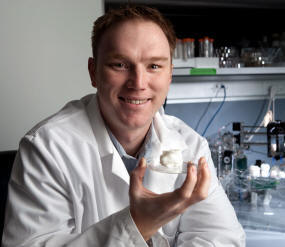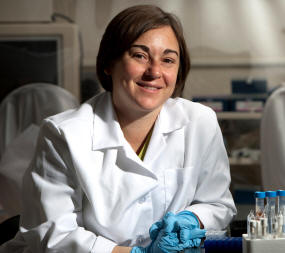|
September 26-29: Ithaca, NY
The Hartwell Foundation held its third Annual Meeting on
Biomedical Research on September 26-29 at the Statler Hotel
on the Cornell University campus in Ithaca, NY.
Thirty-seven scientists, engineers and clinicians
(Individual Award recipients from 2007, 2008 and 2009
and Collaboration Award recipients from 2008 and 2009),
attended from 12 different centers of excellence for
biomedical research in the United States. Each Hartwell
Investigator reviewed progress toward achieving the aims
of their proposed research. In the spirit of The
Hartwell Foundation, investigators revealed their
triumphs, occasional frustrations, and their solutions
to overcoming impediments. These non-competitive
intellectual and technical exchanges reflect how
collaboration and leveraging resources benefit everyone,
a key tenet of The Hartwell Foundationís approach to
fostering research among its awardees.
All meeting participants enjoyed hearing about the broad
scope of innovative research currently supported by The
Hartwell Foundation. The group heard about breakthroughs
in drugs for necrotizing enterocolitis, identification
of causes of gastroschisis, cutting edge research on the
gut microbiome, relationships between inflammation and
obesity, and new approaches to predicting premature
birth. Several approaches to therapy for Type 1 diabetes
were reported, including the use of innovative
bioengineered probiotics and cell replacement therapy.
Advances were reported in "knifeless" surgery in utero
to correct a heart defect, the origins solid tumors and
the delivery of drug therapy across the blood-brain
barrier, tissue engineering of heart valves, bone growth
related to craniosynostosis, and broad spectrum vaccine
development. Biomedical engineering advances were
reported for rapid diagnosis of disease detection,
nano-devices to reduce risk of neonatal pneumonia and
imaging tools for early detection of visual disorders.
Progress was reported in understanding the neurobiology
of emotional dysregulation and autism spectrum
disorders. Gene-disease relationships and approaches for
correcting genetic disorders were among the highlights.
On the Wednesday morning following two full days of
scientific presentations, everyone gathered at Cornell
University Weill Hall and the Department of Biomedical
Engineering to hear faculty presentations on their use
of teleconference technology to link engineering and
surgery; advances in treating neurological disease and
the use of lasers to treat epilepsy; biorobotics to
control the flight of moths; and the advantages of
fluorescent nanoparticles for bioimaging. Following the
presentations, everyone enjoyed a lunch hosted by the
leaders of Cornell University.
The Hartwell Foundation seeks to inspire innovation and
achievement by offering individual scientists and
engineers an opportunity to develop solutions to
problems commonly perceived as too risky to fund by
conventional funding agencies. Through a unique and
selective process, the Foundation provides financial
support to stimulate early-stage biomedical research
that it hopes can and will benefit children of the
United States.
|
|
|

2009 Hartwell
Investigator Jonathan Butcher, Ph.D.,
Cornell University

2009 Hartwell
Investigator Ruth Ley, Ph.D.,
Cornell University
|
|

